By Merle Sprinzen Tessier
Trump is hellbent on making America great again, but great again for who?
“For who?” That seemingly simple question could, with widespread use, mobilize an effective resistance that can win against the assault of Trump’s “flood the zone” strategy of everything, everywhere, all at once.
Just as “Make America Great Again” united Trump’s supporters, our repeating of “Great Again for Who?” could unite us, drawing more supporters and press, increasing the power of our resistance. (And before grammarians say it should be “whom” instead of “who,” please allow me to trade imperfection for rhetorical power while avoiding a label of elitism – remember Apple’s “Think Different”?)
When we speak with one voice, we are harder to ignore. So how can we amplify that unifying voice at the grassroots level? By asking, again and again, “Great Again for Who?”
We are living in a world where the very foundations of “truth” have been eroded. With a few clicks, we can now easily find alternate/opposing “facts” about any topic (flat earth, vaccines, climate change, etc.) from thousands of self-declared “authorities.” Unable to recognize which sources of “truth” are reliable in the firehose of information, we upend the relationship between truth and belief. Where truth once determined beliefs (“I know what is true and therefore I know what to believe”), for too many Americans beliefs now determine truth (“I know what I believe and therefore I know what is true”).
We have become divided into insular echo-chambers that easily disseminate skewed and flawed information. So not only are belief-based views impervious to facts, they’re not even exposed to them.
So how, when “facts” are fluid, do we convince people to mobilize against what they had previously believed? By asking a question that stimulates them to think about their own lives. Asking, not telling. Asking “Great Again for Who?”
A unifying slogan needs to be credible, short, and easy to remember. It needs to apply across disparate groups with widely divergent issues. It needs to be expressed in simple, direct, emotional language that connects to the personal, not to abstract ideas (e.g. autocracy, fascism, defend democracy, etc.). And such a slogan needs to be constantly repeated, like a drumbeat, and used widely and consistently by everyone everywhere. Like Make America Great Again. Like Reagan’s “Are You Better Off Now. . .” And like “Great Again for Who?”
This simple slogan directly challenges Trump’s “Make America Great Again.” It allows us to take the offensive by contrasting our platform with Trump’s. It demands that we question who profits – literally – from each MAGA policy. And it relieves us of the burden to refute every last MAGA lie. Perhaps most importantly, the slogan can motivate Trump supporters to ask “For Who?” of themselves, making it personally relevant. In other words, Trump’s supporters, based on their own experience, could change their own belief-based truth.
What should we do?
I’m proposing that we, at the grassroots, use this slogan everywhere (bumper stickers, billboards, placards, signs, etc.). It should become the umbrella hovering over all our other messages attacking specific policies. We can start that messaging locally, then build momentum to get the slogan adopted nationally. We need to respond to every one of Trump’s actions with “Great Again for Who?”
The question will put the onus on Republicans to demonstrate to their constituents the supposed benefits of their actions. It will throw Republicans on the defensive while giving their supporters the power to push back — “You’re saying this should help me, but it hasn’t.” “Great Again for Who?” changes the conversation from beliefs back to concrete facts.
By CONSTANTLY challenging Trump’s actions with this simple question, we can shine our own light on his policies and make resistance take root in the minds of his supporters. Our voice gets harder and harder to ignore and our resistance becomes more powerful.
Merle Tessier spent more than thirty years developing marketing and sales strategies for both global and start-up companies. She earned her PhD from Harvard in sociology and social psychology while a National Science Foundation Fellow. She now spends her time as a mediator and is learning American Sign Language.

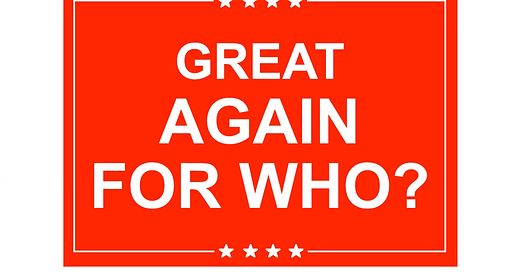


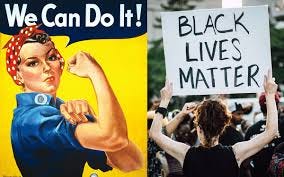

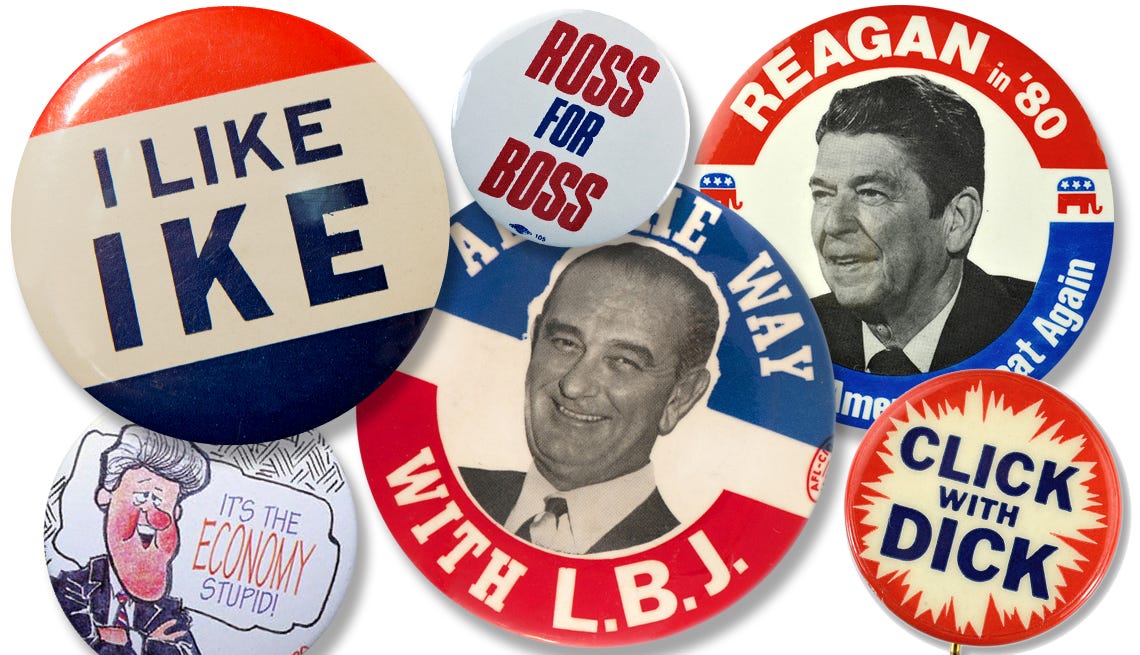
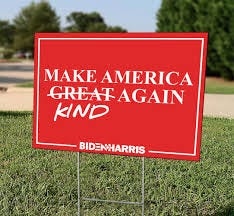
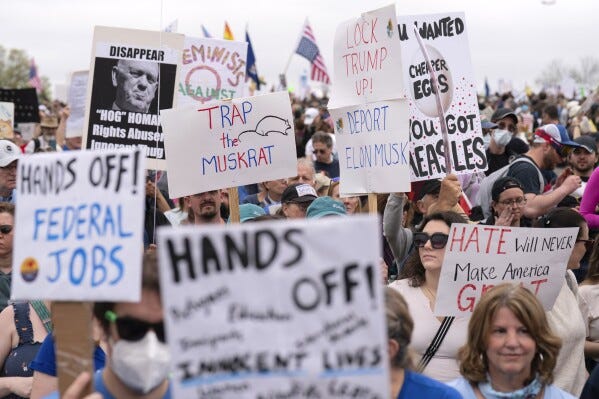

I was the editor on the piece. Son of an English teacher, I changed it to "whom." Merle deftly explained why she preferred "who" and those who jumped on that "mistake" alone did not read the article carefully. The more important point is -- let's get ONE mantra, just like MAGA has. Instead of 3,000 clever signs.
Good idea!
To those who immediately thought 'whom' (as I did) -- read the entire article.